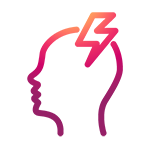What is Dementia?

Dementia is a collective medical term used to describe cognitive decline caused due to the damage of nerve cells in the brain. The disease is characterised by memory loss. But memory loss might have other causes and cannot be the only deciding factor of Dementia.
What are the symptoms of Dementia?
Cognitive Symptoms









Psychological Symptoms
Brain cell death can lead to dementia. In most neurodegenerative diseases, progressive brain cell death that occurs over time, is associated with most dementias. It is however not known if brain cell death is the cause of dementia or if dementia causes brain cell death. Dementia can also be caused by:
- Head injury
- Stroke
- Brain tumour; among other causes
- Prion disease – For example, Creutzfeldt-Jakob disease
- HIV infection
- Reversible factors
A few risk factors can be addressed and reduced to prevent Dementia to an extent.
Factors that cannot be reversed:
- Age
- Family History
- Down’s Syndrome
Factors that can be reversed:
- Diet and exercise
- Alcohol abuse
- Depression
- Diabetes
- Smoking
- Sleep Apnoea
- Vitamin and nutritional deficiencies
- Cardiovascular risk factors.
A proper diagnosis of dementia requires at least two out of the core mental functions to be impaired to intervene with daily living
- Memory
- Language skills
- Ability to focus
- Reasoning and problem solving
- Visual perception.
Neurological evaluation to determine the decline of the core mental function is done through the following tests
- PET scan
- CT scan
- MRI
- Psychiatric evaluation
- Lab tests to exclude other causes
Most types of dementia do not have a cure. The symptoms can, however, be managed through medication and therapy.
Medication
- Donepezil
- Rivastigmine
- Galantamine
- Memantine
- Vitamin D and Omega – 3 rich foods.
Therapy
- Pet
- Music
- Aroma
- Art
- Massage









